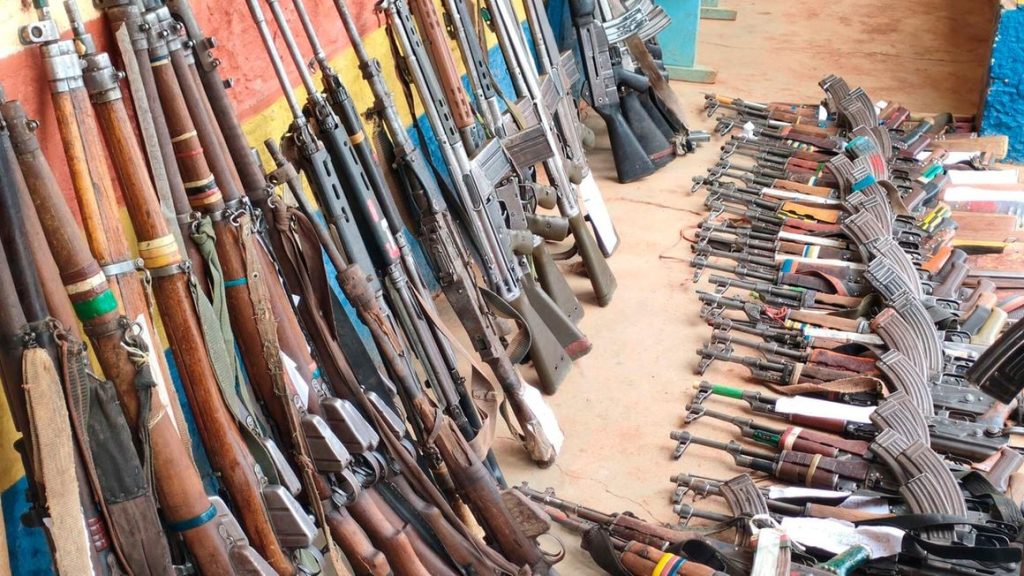Security leaders in East Africa are increasingly relying on new technology to combat the growing issue of illegal arms smuggling. This involves enhancing the tracking of weapon sources, strengthening border patrols, and keeping a better inventory of legally owned weapons. These measures were discussed at a recent meeting in Nairobi, where delegates from 26 African nations gathered to establish a united stance on arms control ahead of an upcoming global conference in the US.
The discussions focused on the danger posed by the illegal trade of small arms across the continent. These weapons have been linked to fueling conflicts, making it harder to achieve long-term peace. A major challenge is tracing the origins of these arms, as Africa becomes a large marketplace for illegal small arms.
Raymond Omollo, Kenya’s Interior Principal Secretary, emphasized that the proliferation and misuse of small arms pose a significant threat to Africa’s peace, stability, and cohesion. He stated, “Small and light weapons continue to cause devastation in communities, drive conflict, destabilize peace, and obstruct socio-economic development across Africa.”
In Kenya, the problem of banditry has become more difficult to manage due to the easy availability of smuggled small arms, mainly brought in through poorly controlled borders. However, experts argue that simply monitoring borders will not be enough to solve the issue. Many arms are produced outside Africa and continue to flow into the continent, contributing to the violence.
The conference, which was attended by senior officials from the United Nations, the African Union (AU), and regional organizations, explored how the AU could develop a common arms control policy. This would require financial resources and new technologies to trace weapons from their source to the end-user, as well as systems for recycling or decommissioning expired arms.
Christopher Kayoshe, the acting head of the AU’s Disarmament, Demobilisation, and Reintegration Division, noted that the goal of “silencing the guns,” originally set for 2022, has been extended to 2030. He stressed the importance of African countries working together to achieve this, saying, “It is crucial that the continent is unified in its approach, ensuring that AU-led discussions are productive and impactful.”
One of the AU’s key tools in this effort is the Bamako Declaration, which provides a framework for coordinated African participation in global arms control negotiations. This policy, however, relies on the assumption that African governments will work together and maintain political stability.
In some African countries, such as South Sudan, arms embargoes have been imposed, yet the illegal flow of weapons persists, fueling conflicts. Similar embargoes were imposed on Somalia and the Democratic Republic of Congo until last year, but violence in eastern DRC continues, driven by illegal arms trade.
The upcoming global arms control conference in New York, known as RevCon4, will focus on improving arms tracing. Maritza Chan, the conference’s president-designate, emphasized the need for accountability on the supply side of the arms trade. She stated that arms manufacturers must also take responsibility for the illegal circulation of their products.
Izumi Nakamitsu, the UN’s Under-Secretary-General for Disarmament Affairs, warned that the easy availability of small arms is hindering peace efforts in Eastern and Southern Africa. She noted, “The illicit proliferation and misuse of small arms is a significant factor in much of the human suffering we witness worldwide.”
The ease with which small arms cross borders has also been linked to terrorism, poaching, and armed insurgencies across Africa. According to the United Nations Institute for Disarmament Research (Unidir), out of the 40 million small arms on the continent, 40 percent are in illegal hands.
Globally, there are an estimated one billion small arms in circulation, responsible for about 250,000 deaths each year. Unidir data shows that in 2021 alone, 260,000 people were killed by small arms. These weapons account for 45 percent of all violent deaths worldwide.
In East Africa, countries like Sudan, South Sudan, Ethiopia, Kenya, and Uganda are major contributors to the region’s challenges of human smuggling, arms trafficking, and other organized crime, as highlighted by the 2023 Africa Organized Crime Index. The report revealed that human trafficking and arms trafficking are the two most widespread criminal markets in the region.























